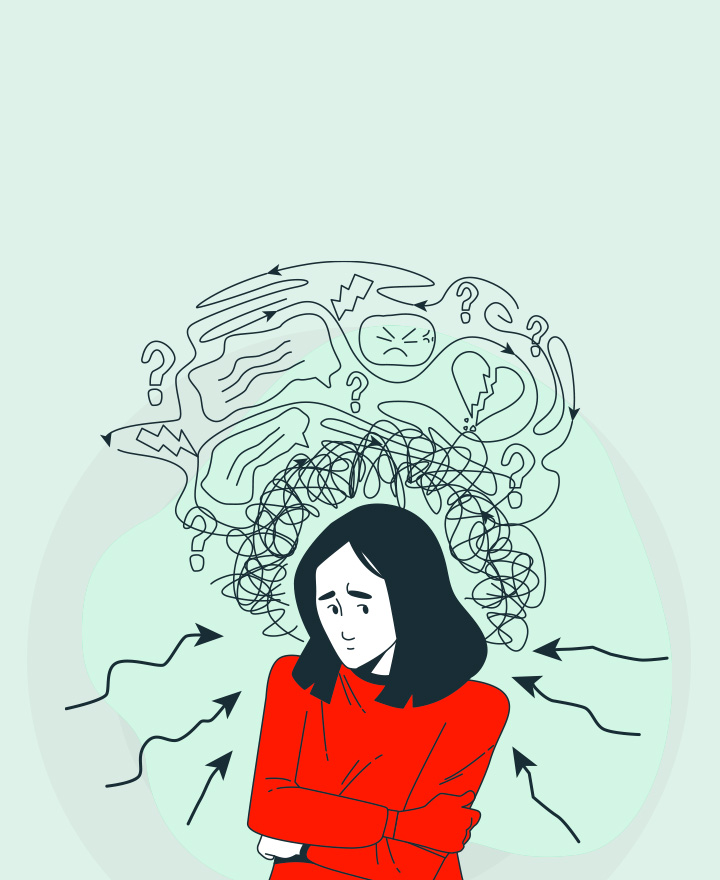

Does Rainy Weather Causes Anxiety?
The monsoon season is the most common time of the year when one is more likely to experience mental health issues like anxiety disorders. This is because people tend to feel depressed, lonely, tired, and fearful when it rains heavily. The gloomy sky doesn’t help the situation, either. Practising simple coping mechanisms can help to a certain extent. However, if the anxiety persists, and if one continues to harbour a lot of negative feelings during this season, seeking professional help is mandatory. Read on to know more.
Anxiety Triggers during Rainy Weather
Can rainy weather cause anxiety? Yes, of course! The following anxiety triggers are common during this season —
• Minimal sunlight
Exposure to sunlight regulates the serotonin and melatonin in your body. These hormones regulate your mood swings and sleep patterns.
During rainy seasons, the sky is gloomy, and exposure to sunlight is minimal. This affects the production of these “happy hormones”, triggering depression, fear, anxiety, and other related issues in some people.
• Fear of changing climate
Heavy rains lead to floods and a lot of damage in terms of life and finances. Hence, heavy rains can lead to a sense of fear, dismay, hopelessness, and anxiety.
• Boring routine
Sometimes, during the rainy season, people are stuck indoors, as they aren’t able to travel for work or perform outdoor activities. This triggers a lot of negative feelings and anxiety in their minds.
• Irregular eating and sleeping cycles
Since the melatonin and serotonin hormones are not regulated during the gloomy climate, some people don’t feel the urge to eat or sleep on time, leading to depression.
• Unpleasant rain-related memories of the past
Some people may have lost their loved ones or experienced bitter things during the floods or rains. This triggers fear and uneasiness in them, leading to PTSD (post-traumatic stress disorder) issues.
• Loneliness
Spending long hours indoors during the monsoon limits the time spent with friends from work and exercise groups. This absence of social life can affect certain people quite severely, leading them to go into their shells.
Coping Mechanisms
Here are some tips that can help manage the situation better:
• Watch out for sunlight, and expose yourself to it (even a little bit can help you to a great extent)
• Eat and sleep on time
• Keep yourself well-hydrated
• Participate in group or community activities whenever possible
• Keep yourself active physically and mentally
• Get professional help
Professional Support Options
Seeking professional help can aid in getting rid of the negativity and SAD-related symptoms you experience. This help can be in the form of:
• Therapy Sessions – Cognitive behavioural therapy, hypnotherapy, and exposure therapy sessions
• Medications – Antidepressants
• Combination of therapy and medications
FAQs
1. Why does the rainy season make you anxious?
The gloomy weather and lack of sunlight during the rainy season can make some people fearful, anxious, and hopeless.
2. Who is more prone to anxiety issues during the rains?
People with already existing mental health issues and those who have had unpleasant experiences in a similar situation before are more prone to anxiety disorders during the rainy season.
Conclusion
The rainy season can trigger anxiety disorder symptoms. The key is to watch out for the change in one’s mood and practice the coping mechanisms to keep the issue at bay. However, you must seek professional help immediately if negative feelings start to dominate your mind during this season.
One of the important components of our overall wellness is also being financially secured. Healthcare emergencies can happen any time, but a good health insurance policy can protect you from such uncertain situations. To know more about Wellness and other health related tips, visit the wellness corner.
Source: thespinoff.co.nz, beyondblue.org.au, healthline.com, medicinenet.com
Disclaimer: This blog provides general information and discussions about health and related subjects. The information and other content provided in this blog, website or in any linked materials are not intended and should not be considered, or used as a substitute for, medical advice, diagnosis or treatment. Kindly contact your Doctor before starting a new medicine or health regime.
Related Articles
Exploring Different Types of Anxiety Disorders
Generalized Anxiety Disorder - Unravelling Its Root Causes
Illness Anxiety Disorder & Its Classification
Published on October 3, 2024














 Health Insurance
Health Insurance  Travel Insurance
Travel Insurance  Car Insurance
Car Insurance  Cyber Insurance
Cyber Insurance  Critical Illness Insurance
Critical Illness Insurance
 Pet Insurance
Pet Insurance
 Bike/Two Wheeler Insurance
Bike/Two Wheeler Insurance  Home Insurance
Home Insurance  Third Party Vehicle Ins.
Third Party Vehicle Ins.  Tractor Insurance
Tractor Insurance  Goods Carrying Vehicle Ins.
Goods Carrying Vehicle Ins.  Passenger Carrying Vehicle Ins.
Passenger Carrying Vehicle Ins.  Compulsory Personal Accident Insurance
Compulsory Personal Accident Insurance  Travel Insurance
Travel Insurance  Rural
Rural